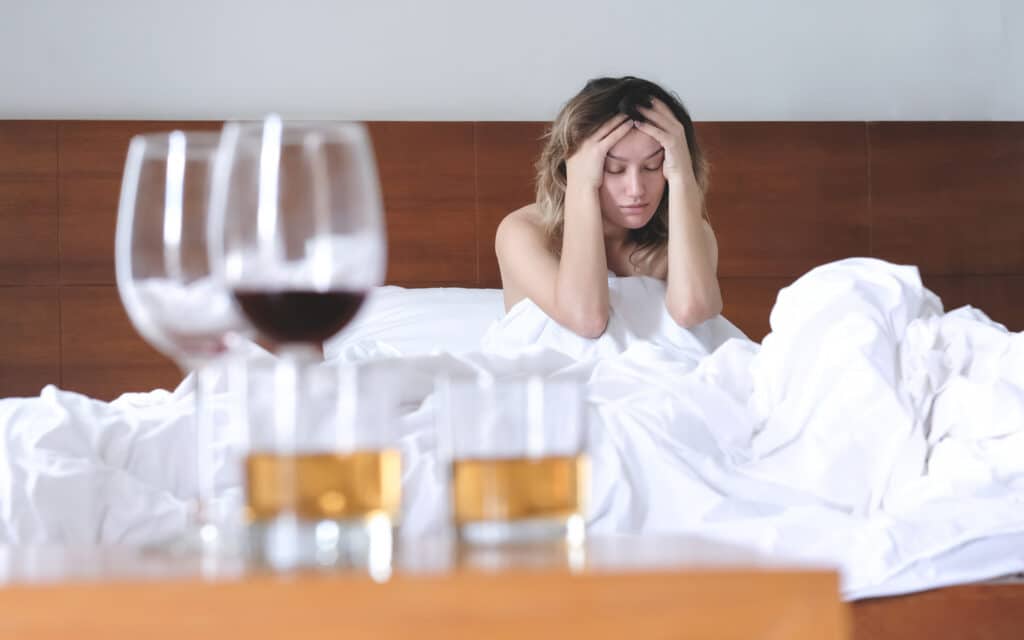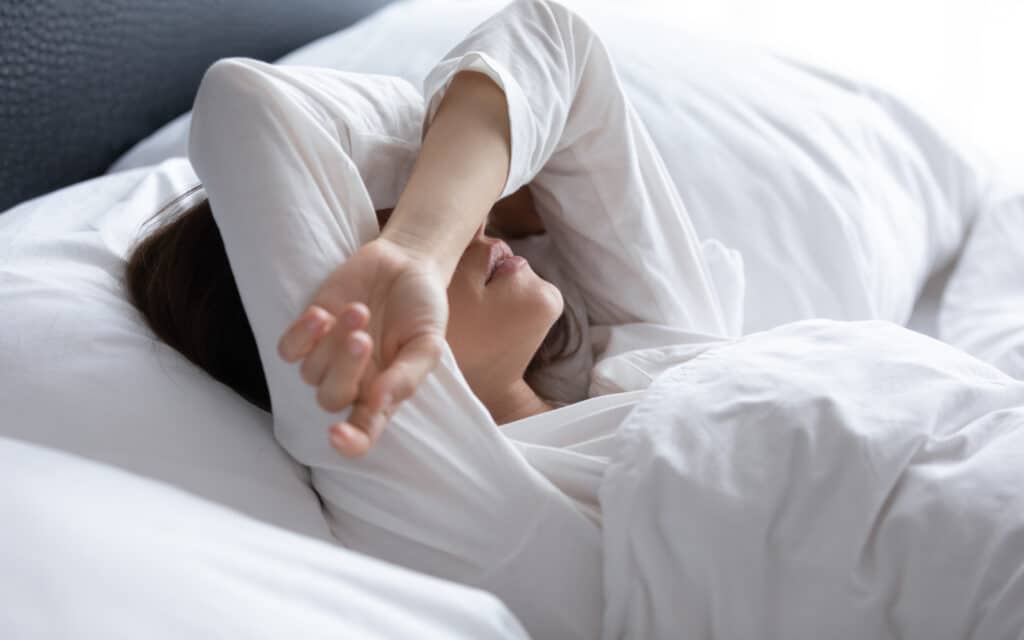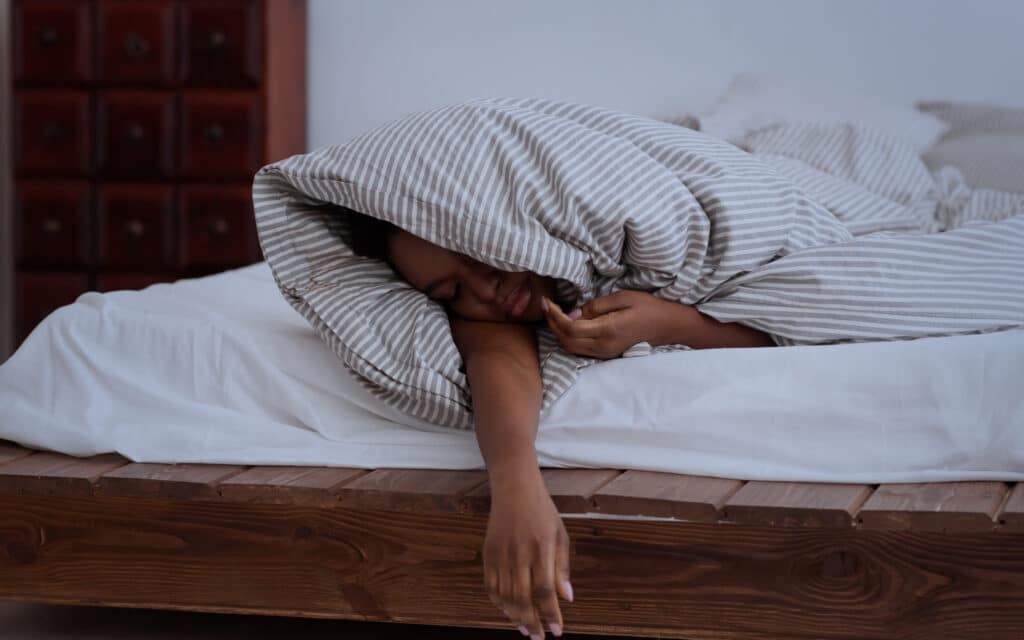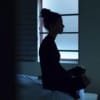Can’t sleep without alcohol? It’s more of a common problem than you might think. For many of us, a glass of wine or a couple of beers before bed feels like an excellent way to relax before sleep.
Alcohol can help to reduce feelings of stress, and make you feel more comfortable drifting off into oblivion. The only problem? Drinking every night can be a slippery slope.
The more you continue using alcohol to sleep, the more your body becomes reliant on an extra night cap before it can drift off.
Your routine before bed is how you tell your body and brain it’s time to switch off. Some people feel like they can’t sleep without having a hot bath, others rely on soothing teas.
Unfortunately, if you need alcohol to sleep, you may struggle long-term.
Here’s what you need to know about trouble sleeping without alcohol.

Trouble sleeping without alcohol: Where it starts
There are plenty of ways you can prepare your body for bed.
Positive activities like yoga, meditation and warm baths are a great way to soothe your senses, without causing any long-term issues.
Using alcohol to sleep might seem like a good idea at first, but after a while you notice the long-term problems.
Alcohol can make you sleepy initially, by influencing your brain function. However, booze also has a significant impact on your sleep pattern.
Research shows alcohol often has a detrimental effect on your ability to access high quality, deep sleep. Even if you do fall asleep faster after a drink, you’re likely to have a disturbed night.
What’s more, because your body gradually gets used to alcohol, you may find you need to drink more each night to get the same relaxing sensations.
Over time, you could end up relying heavily on dangerous amounts of booze.
Why using alcohol to sleep is a bad idea
Alcohol is a stimulant and a sedative at the same time.
Sure, at first you feel cozy, warm, and relaxed – perfect for sleep.
But the experience doesn’t stop there.
When you drink, you’re more likely to fall asleep faster. You’re also more likely to wake up through the night, and experience fewer periods of deep sleep.
This is because your body will be working on metabolizing the alcohol through the night.
As alcohol starts to leave your system, there’s a rebound effect which stimulates your brain and disrupts your sleep cycle.
Because your brain can’t go through the natural restorative stages it depends on in sleep, you wake up feeling exhausted.
Alcohol can also disrupt your sleep because it’s a diuretic. This means you’ll probably end up running to the bathroom more often during the night.
Wayne State University tells us drinking booze before bed leads to more crazy dreams, increased risk of snoring, and higher problems with night sweats.
You don’t need alcohol to sleep
If you’ve been using alcohol to sleep for a while, you might think you can’t sleep without drinking. Your body and brain tell you that you need the initial relaxation to wind down, but this is not necessarily true.
There are other things which can help you to sleep besides booze.
As with most habits, getting over a period of trouble sleeping without alcohol is all about making some changes to your routine.
First, start by considering your sleep pattern. Were you having trouble getting a normal sleep cycle before you turned to booze?
If you struggled with things like restless leg syndrome, snoring, or sleep talking, there may be a sleep disorder at the heart of your problem.
This means talking to a professional about strategies to overcome your sleep disorder.
If the crux of your problem is you think you need alcohol to sleep, try working on your sleep hygiene:
- Create a new bedtime ritual: Your body uses your rituals before bed as a sign it’s time to go to sleep. If you’re used to drinking alcohol before bed, trying changing the ritual and implementing something new. Have a warm bath, or a cup of tea, instead of a glass of wine.
- Update the environment: Make sure nothing in your environment is disrupting your sleep. Your bedroom should be cool, dark, and comfortable. Remove any electronic devices if possible, as they can interfere with melatonin levels. It’s also worth investing in some cozy blankets, great pillows, and light-blocking shades.
- Maintain the same schedule: Get up at the same time each morning and make an effort to go to bed at a consistent time each night. This will help your brain and body to get into a routine easier to follow.
- Avoid stimulants: Try to stay away from stimulants during the night, such as caffeine, soft drinks, and even chocolate. Nicotine can also harm your sleep quality – so make sure you look into ways to cut down.
- Don’t nap: Napping might seem like a good idea, but it also makes it harder to fall asleep later in the day.

How long does insomnia last after you stop drinking?
If you’ve entered a stage in your life where you can’t sleep without alcohol, it can be challenging to make a change.
Habits are tough to break, particularly when it comes to sleep patterns. The quicker you start working on breaking your bad habits, the easier it will be to create a healthier sleep routine.
Some studies suggest sleep problems can persist for a few months after you quit drinking. It takes time for the brain to get used to a new routine.
Don’t give up if you don’t notice any massive changes straight away. You might also find you need to continue using alcohol to sleep in small doses before you can taper off entirely.
The key to success is sticking to your new routine as much as you can. If you think your problems with sleep might go beyond alcohol, then it’s worth talking to a medical professional.
If you’re struggling with feelings you need alcohol to sleep, try checking out some of these helpful books for additional guidance:
- This Naked Mind: A book on how to control the use of alcohol.
- The 28-day alcohol-free challenge: A guide to improving sleep without alcohol.
- Quit like a woman: Guidance for quitting alcohol.
- How to quit alcohol in 50 days: Support to stop drinking.
One thing you’re likely to notice when you’re trying to stop using alcohol to sleep, is it takes a lot longer for you to fall asleep initially at night.
If this is the case, try to find some relaxing way to ease your mind when you go to bed. You could listen to an audio book, or some soft music. Some people also find journaling helps them to reduce feelings of anxiety.
Is it hard to sleep after quitting drinking?
Though we know alcohol isn’t a great way to get to sleep long-term, it can feel like a good choice when you’re struggling with insomnia. However, the more reliant you become on using alcohol to sleep, the harder it’s going to be to change your routine again.
Getting to sleep after you quit drink entirely can also be a challenging experience, though it gets easier with time.
If you find you’re struggling with sleep, and you can’t sleep without alcohol, you may want to consider some additional treatments for insomnia.
For instance, many doctors believe cognitive behavioral therapy for insomnia is a fantastic tool. This process helps you to change your sleep habits, which could include cutting down on alcohol too close to bedtime.
There are various complementary therapies available to ensure you don’t have to switch trouble sleeping without alcohol to issues sleeping without medication.
While medicine can help with sleep problems short-term, much like alcohol, it has various long-term side-effects.
Complementary therapies like relaxation and biofeedback therapy, yoga, mindfulness meditation, progressive muscle relaxation, and aromatherapy can all assist with your sleeping patterns.

Why can’t I sleep when I don’t drink alcohol?
Figuring out how to sleep without alcohol can be an exhausting process in its own right. The more you build on your belief you need alcohol to sleep, the more drink becomes a crucial part of your nighttime routine.
However, the reality is all you actually need to sleep may be a cool, comfortable, and dark room.
If you think you can’t sleep without alcohol, your best bet is to switch your reliance on alcohol for something else you can do each night, like drinking a cup of tea.
At first, it’s not going to be easy to change the routine, but over time, you’ll develop a healthier schedule which doesn’t rely on booze.
Siestio. Sleep matters.
Affiliate disclaimer
Just so you know… This article contains affiliate links. The commission we earn helps to cover our costs, and comes at no additional cost to you. For more information on our affiliate program, please refer to our disclosure policy.
Medical disclaimer
You must not rely on the information provided on our website as an alternative to medical advice from your doctor or other healthcare professionals. For more information read our full disclaimer here.








